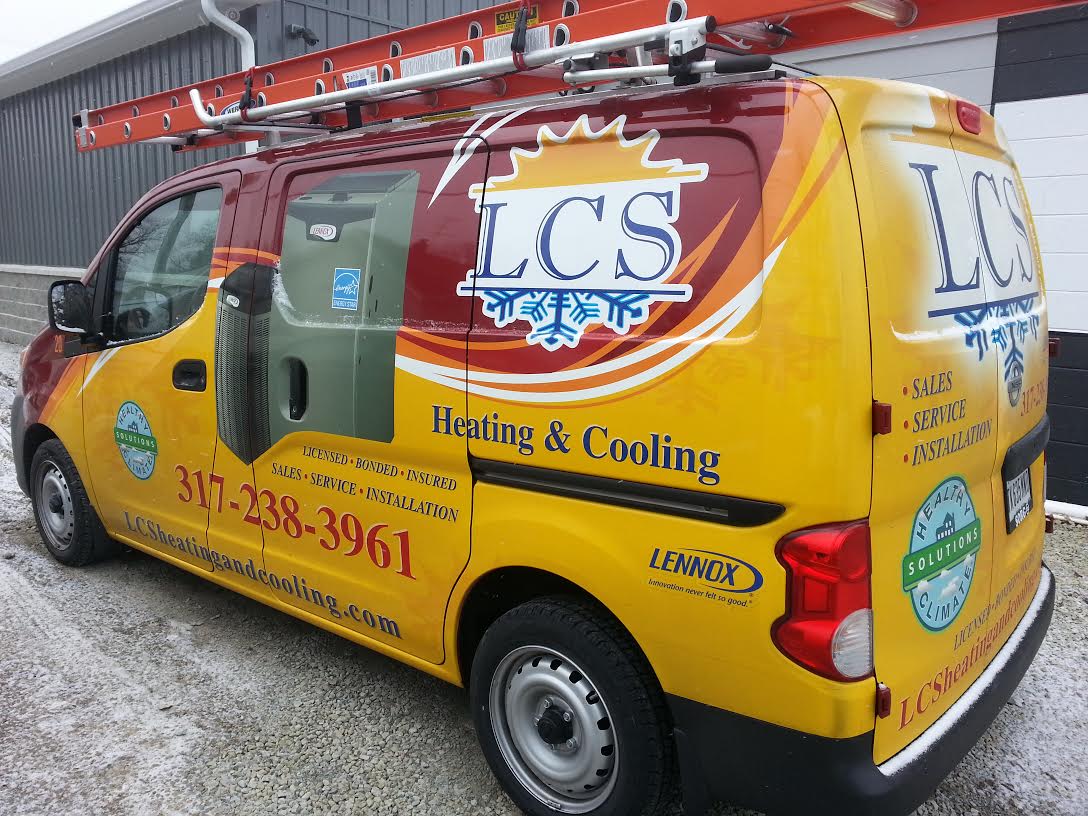In an ideal world, furnaces and air conditioners would only need service during regular business hours of 8am-5pm, Monday through Friday. That's not reality though! Customers will often say things like "I'm having people over for the holiday and my furnace just quit working" or "of course this couldn't have happened during the day" or "it was working fine yesterday!" HVAC can be unpredictable which is why Emergency Service or After Hours Service is available.
We want to provide a little information on our after hours service and some changes that have taken place within LCS. We have a story for you:
Many of you have either met or spoken to Travis or Renee, the owners of LCS Heating and Cooling. For over eight years, Travis and Renee took all of the incoming calls. With the continued growth of LCS, they were finding that they couldn't keep up on the calls. People were getting frustrated for a few reasons: 1. They were getting voicemail when they called 2. Their calls were not getting returned fast enough 3. They felt that their HVAC needs/projects/jobs weren't important. 4. Travis' phone ringing while he was meeting with customers made the customer feel like he wasn't focused.
Obviously, this was a problem! Travis and Renee felt that their inability to keep up with the phone calls was affecting the high level of customer service that they wanted to offer. The solution:
In July of 2013, they hired an office manager. Chasity is a great asset to the LCS team! Phone calls that are coming in during the day are answered, phone calls are returned and follow-up calls are made in a timely manner. Of course, Travis and Renee are always reachable by phone or email but Chasity handles much of the scheduling now.
The one problem Travis and Renee were still having was answering all of the after hours calls. These calls were being forwarded directly to Renee's cell phone. Every night, every weekend and every holiday, Renee and Travis were answering calls. Their solution to being on the phone so much was to let after hours calls go to voicemail and then returning the calls that were emergency calls in which someone needed service right away. As it turns out, people don't like leaving a message! If they needed service at 9:00pm, they didn't want to leave a message about it. They wanted to talk to someone about getting service! After receiving some great feedback from customers regarding talking to a real person versus leaving a message, Travis and Renee decided they needed a new solution. They couldn't handle all of the calls but customers didn't like leaving messages. The solution:
In February 2014, Travis and Renee hired an answering service. The answering service simply acts as an extension of LCS Heating and Cooling after regular business hours. ALL calls are answered and our customers will always have a person to talk to...whether it's midnight, a Sunday or a holiday. If the call is for immediate service, the information gets sent to the LCS technician on call. These calls are then handled right away by the technician. If the customer is calling regarding something other than immediate service, the information is sent to the LCS office and either Chasity or Renee will follow up the next business morning.
Why are we telling you all this? Because we care about what our customers think and we want our customers to understand the process. We've had some mixed feedback regarding the answering service. Most of it has been good as people are happy to have the phone answered no matter when they call. We've also had some great feedback regarding phone conversations with the answering service themselves. They are efficient and we are happy with their service. We have had some feedback in which people are unhappy that it's not Travis or Renee answering the phone or that Travis isn't available to talk at that time. This has been an adjustment for everyone. It's hard to make changes when things have been done a certain way for almost nine years.
We promise, these are GOOD changes. Providing the best possible customer service is a priority for us. We want to thank you for your business, your referrals and an exciting 8.5 years! We're looking forward to growing our business with you and providing you exceptional service...any time, any day or any night. If you have any feedback for us, it's always appreciated and can be emailed to Renee through the website: www.LCSheatingandcooling.com
March 13, 2014
HVAC Repair or Replace: 5 Considerations
Heating and Air Conditioning is one of those necessary evils. It's much more fun to spend money on a new TV rather than a new furnace! At some point though, you may be faced with the ultimate HVAC decision: Repair or Replace? Here are a few things to consider when you are faced with this decision:
- What is the age of your current system? Most equipment comes with a 10 year manufacturer warranty on parts. The average life expectancy of a furnace and air conditioner is 12-15 years. That's not to say that it won't last longer than that...it's just an average. If the part is under warranty, it's most often going to make more sense to have the repair done. If the part is not under warranty, then you may want to factor in the age of the equipment with the repair cost. For example, if you have a $200 repair on a 15 year old furnace, it may certainly make more sense to take your chances and make the repair. Now, on the flip side of that example, say your furnace is 15 years old and you're looking at a $500 repair. You could have that repair done and not have another problem for a few years. You could also make that repair and a few months later, have another part go out. Before you know it, you have $800 into a 15 year old furnace. Since there is a risk of other parts failing on older equipment, it may be worth considering replacement.
- Energy Efficiency: Your HVAC system uses a considerable amount of energy as compared with other appliances in your home. If you have an older system, it's very likely that new equipment will be more efficient, resulting in lower utility bills. Let's use the example of a $500 repair on the a 15 year old furnace. If you're considering replacement, factor in the savings if you go from an 80% efficient furnace to a 95% efficient furnace. Think about it in this way: For every $100 that you spend to heat your home with an 80% furnace, $80 is heating your home and $20 is going out the flue. For every $100 that you spend to heat your home with a 95% furnace, $95 is being used to heat your home and only $5 is being lost. Air conditioners and heat pumps also vary in efficiency. This is definitely something to think about when considering repair versus replacement.
- Financial Incentives: Are there financial incentives to upgrade to a new, more efficient HVAC system? Currently, there is a federal tax credit and various utility rebates available for the installation of high efficient furnaces, air conditioners and heat pumps. The qualifications and dates do change so it's important to see what, if any, are available.
- Length of Time in Home: How long are you planning to live in your home? If you are planning to stay in your home for awhile, you might have different factors to consider than if you are planning to sell in the near future. If you are thinking about selling, definitely compare costs. A repair might be the way to go simply because you don't want to spend money in a home that you are selling. However, replacing the HVAC equipment might be a good investment because it will make the house more appealing to potential buyers. If you are planning to stay for a while and are looking at a costly repair, it might make more sense to upgrade and get a new 10 year parts warranty.
- Comfort: HVAC equipment and technology have come a long way over the past several years! Furnaces are now available with variable speed motors which are not only more efficient but also produce a more even and comfortable heat in the winter and coolness in the summer. Programmable and/or WiFi thermostats are designed to reduce temperature swings, provide the ultimate control over your system and save on energy usage when you are not home. Finally, there's the noise. Maybe your HVAC equipment is loud because something is out of balance. That could very well be an easy repair! If not, consider replacing it with equipment that is quieter. There are some systems that are so quiet, you cannot hear them run!
Repairing or replacing your furnace and/or air conditioner can be quite an investment. Think about what's important to you when making the decision!
Is It an Air Conditioner or Is It a Heat Pump?
We hear people say all the time that they don't know what to call the thing that cools their home. Is it a condenser? An air conditioner? A heat pump? A condenser is the term used to describe the outdoor unit that cools your home, which can be either an air conditioner or a heat pump. The primary difference between an air conditioner and heat pump is that the air conditioner is used to cool a space while a heat pump can heat and cool a space. There are definitely important factors to consider when looking into purchasing air conditioner or a heat pump.
A heat pump acts just like an air conditioner in the summer months. The purpose is to cool your space and lower humidity levels. During the winter months, a heat pump will also produce heat to warm your home or office. Whether you have an air conditioner or heat pump, you'll also have either a gas or electric furnace to go with it. A heat pump efficiently produces heat until the outdoor temperature drops to about 30 or 35 degrees. In very cold weather, the heat pump will not be able to keep the desired temperature inside. At that point, the furnace, located indoors, will turn on to help warm the home to the temperature set on the thermostat. If you have an electric furnace, it will start to run with the heat pump. If you have a gas furnace, the system will automatically switch from the heat pump to the gas furnace.
Which makes most sense for your home or office--an air conditioner or heat pump? If you have an electric furnace, also called an air handler, it's highly recommended to pair that furnace with a heat pump. It's quite expensive to run an electric furnace by itself. Since a heat pump is much more efficient, your utility costs will be much lower if you have a heat pump to use in the winter. The electric furnace will then act as your back-up heat.
If you have a gas furnace, it's really personal preference. If you are used to the heat produced by a gas furnace, you may not like the heat produced by a heat pump as it is a cooler heat. If you are likely to use the gas furnace all winter, then it might make more sense to pair it with an air conditioner, which often has a lower upfront cost. However, if utility costs are a priority, it might be a better option to have a heat pump installed.
There are lots of questions to ask when considering a new air conditioner or heat pump. Feel free to contact us anytime!

